Related Research Articles

Arms trafficking or gunrunning is the illicit trade of contraband small arms, explosives, and ammunition, which constitutes part of a broad range of illegal activities often associated with transnational criminal organizations. The illegal trade of small arms, unlike other organized crime commodities, is more closely associated with exercising power in communities instead of achieving economic gain. Scholars estimate illegal arms transactions amount to over US$1 billion annually.
Universal jurisdiction is a legal principle that allows states or international organizations to claim criminal jurisdiction over an accused person regardless of where the alleged crime was committed, and regardless of the accused's nationality, country of residence, or any other relation to the prosecuting entity. Crimes prosecuted under universal jurisdiction are considered crimes against all, too serious to tolerate jurisdictional arbitrage. The concept of universal jurisdiction is therefore closely linked to the idea that some international norms are erga omnes, or owed to the entire world community, as well as to the concept of jus cogens – that certain international law obligations are binding on all states.
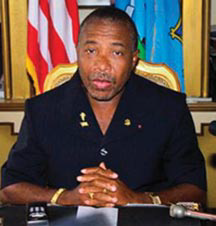
Charles McArthur Ghankay Taylor is a Liberian former politician and convicted war criminal who served as the 22nd president of Liberia from 2 August 1997 until his resignation on 11 August 2003 as a result of the Second Liberian Civil War and growing international pressure.

Viktor Anatolyevich Bout is a Russian arms dealer and politician. A weapons manufacturer and former Soviet military translator, he used his multiple companies to smuggle arms from Eastern Europe to Africa and the Middle East during the 1990s and early 2000s. Bout gained the nicknames the "Merchant of Death" and "Sanctions Buster" after British minister Peter Hain read a report to the United Nations in 2003 on Bout's wide-reaching operations, extensive clientele, and willingness to bypass embargoes.
Frans Cornelis Adrianus van Anraat is a Dutch war criminal and a businessman. He sold raw materials for the production of chemical weapons to Iraq during the reign of Saddam Hussein. In December 2005, a court in The Hague convicted him of complicity in war crimes for his role in selling chemical weapons to Saddam's government. He was given a 15-year sentence. On appeal, Anraat's sentence was increased to 17 years, then reduced to 16.5 years. He was released from prison in 2015.
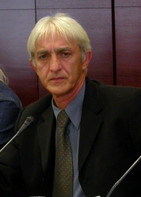
Dragan Vasiljković, nicknamed Captain Dragan is a convicted war criminal and former commander of a Serb paramilitary unit called the Kninjas during the Yugoslav Wars. In 2005, prosecutors in Croatia accused him of committing war crimes during the wars. A warrant for his arrest was subsequently issued by Interpol.

The Special Court for Sierra Leone, or the "Special Court" (SCSL), also called the Sierra Leone Tribunal, was a judicial body set up by the government of Sierra Leone and the United Nations to "prosecute persons who bear the greatest responsibility for serious violations of international humanitarian law and Sierra Leonean law" committed in Sierra Leone after 30 November 1996 and during the Sierra Leone Civil War. The court's working language was English. The court listed offices in Freetown, The Hague, and New York City.
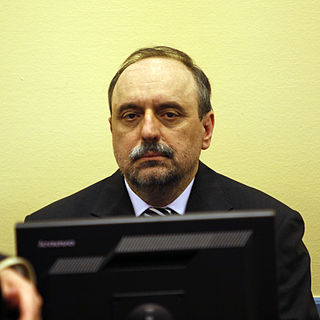
Goran Hadžić was a Croatian Serb politician and President of the self-proclaimed Republic of Serbian Krajina, during the Croatian War of Independence. He was accused of crimes against humanity and of violation of the laws and customs of war by the International Criminal Tribunal for the former Yugoslavia.
Transnational crimes are crimes that have actual or potential effect across national borders and crimes that are intrastate but offend fundamental values of the international community. The term is commonly used in the law enforcement and academic communities. Transnational organized crime (TOC) refers specifically to transnational crime carried out by crime organizations.
Walter Douglas is an alleged Scottish drug trafficker and organised crime figure, dubbed the Tartan Pimpernel by the press, who is reportedly one of the richest in the United Kingdom with an estimated worth of £20 million. He was allegedly wanted in at least three countries on drug trafficking and gun running charges as of 2003, and Douglas was reported to have had ties to numerous international criminal organisations in Europe and North America as the head of the Delta crime syndicate. But in fact nothing has ever been proved against Douglas. In October 2013 there were no longer any warrants out against him and he staunchly maintained his innocence to a British journalist
Leonid Efimovich Minin is an international arms trafficker. He was arrested on August 4, 2000 by Italian authorities in Cinisello Balsamo near Milan. Minin had been under surveillance since 1992 for his suspected illegal arms dealings, mostly to West African nations. He was sentenced to two years in prison in Italy.
Kouwenhoven is a Dutch toponymic surname Notable people with the surname include:
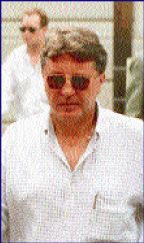
Vito Roberto Palazzolo is an Italian businessman previously living in South Africa. Born in Terrasini, he moved to South Africa in the mid-1980s. He also goes by the name Robert von Palace Kolbatschenko. He is alleged to be a member of the Sicilian Mafia, an allegation he denies. In March 2009, the highest court in Italy confirmed a 2006 nine-year sentence for association with the Mafia. He is alleged to be a Mafia treasurer linked to Bernardo Provenzano, the Mafia boss arrested in April 2006 in Corleone, Sicily, and his predecessor Salvatore Riina, both serving life sentences in Italian jails. Palazzolo maintains his innocence and claims that he has been persecuted by the Italian government, the press, lawyers, politicians, and "opportunists" for many years. On March 30, 2012 Palazzolo was arrested by Interpol at Suvarnabhumi Airport in Bangkok, Thailand.
A drug lord, drug baron, kingpin, or lord of drugs is a type of crime boss in charge of a drug trafficking network, organization, or enterprise.
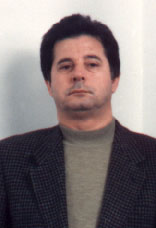
Giovanni "John" Gambino was an Italian-born American mobster. Born in Palermo, Sicily, he became a made member of the Gambino crime family in 1975 and a capodecina or captain, and head of the crime family's Sicilian faction, appointed by family boss John Gotti in 1986, according to Mafia turncoat Sammy Gravano.
The Prosecutor v. Ratko Mladić was a war crimes trial before the International Criminal Tribunal for the former Yugoslavia (ICTY) in The Hague, Netherlands, concerning crimes committed during the Bosnian War by Ratko Mladić in his role as a general in the Yugoslav People's Army and the Chief of Staff of the Army of Republika Srpska.
Hassan Bility is a Liberian journalist, and the founder and Director of the Global Justice and Research Project (GJRP), a non-governmental organization dedicated to the documentation of war time atrocities in Liberia and to assisting victims in their pursuit of justice for these crimes.

On December 8, 2022, Russia and the United States conducted a 1-for-1 prisoner exchange, trading Brittney Griner, an American basketball player, for Viktor Bout, a Russian arms dealer. Griner, a WNBA champion star and Team USA Olympic athlete, had been convicted of smuggling and possession of cannabis in Russia in August 2022 and sentenced to nine years in prison. Bout had been arrested in Thailand in 2008 and transferred to the custody of the United States, where he was convicted of terrorism-related charges and sentenced to 25 years in prison in 2012. The exchange took place at Al Bateen Executive Airport in Abu Dhabi, United Arab Emirates, following months of negotiations.
References
- ↑ "Homepage". Haguejusticeportal.net. Retrieved 2022-11-22.
- ↑ "Guus Kouwenhoven". www.liberiapastandpresent.org. Archived from the original on May 25, 2022.
- ↑ Howden, Daniel (18 May 2006). "Crimes against humanity: Anatomy of an arms dealer". Independent. Retrieved 15 December 2017.
- ↑ "How a tyrant's 'logs of war' bring terror to West Africa". the Guardian. 2001-05-27. Retrieved 2022-11-22.
- 1 2 3 Behr, Mike (9 December 2017). "Gunrunner arrested in Cape Town for war crimes in Liberia". IOL. Retrieved 14 December 2017.
- 1 2 "Taylor Made: The Pivotal Role of Liberia's Forests and Flag of Convenience in Regional Conflict" (PDF). Global Witness. 2001. Retrieved 14 December 2017.
- ↑ Hotel Africa and the crumbling of modernity, Malkit Shoshan, 2017 (Canadian Center for Architecture website)
- ↑ Crimes against humanity - anatomy of an arms dealer, Daniel Howden, May 19, 2006 (The Independent)
- ↑ UN report for assets freeze and ban on arms sales, with list including Guus Kouwenhoven, Viktor Bout and Richard Amar Chichakli.
- ↑ Liberia: Taylor Allies Join Him in Prison, Othello B. Garblah, April 24, 2017 (AllAfrica.com)
- ↑ Arms and the Man, a visit to Bout and Chichakli in Moscow. Peter Landesman, August 25, 2003 (with permission from The New York Times, Archived Global Policy Forum)
- ↑ Australia holds arms dealer Viktor Bout's 'accomplice'. January 11, 2013 (BBC website)
- ↑ "Kouwenhoven vrij tot rechtszaak" (in Dutch). Reformatorisch Dagblad. 19 March 2017. Retrieved 14 December 2017.
- ↑ "Guus Kouwenhoven". Hague Justice Portal. Retrieved 14 December 2017.
- ↑ "Dutch Supreme Court quashes Court of Appeal decision in Guus K. case". The Hague Justice Portal. 20 April 2010. Retrieved 14 December 2017.
- ↑ "Anonymous witnesses lost case - Kouwenhoven kwijt" (in Dutch). De Telegraaf. 10 February 2017. Retrieved 14 December 2017.
- ↑ "Zakenman Kouwenhoven krijgt 19 jaar voor wapenhandel in Liberia" (in Dutch). Nederlandse Omroep Stichting. 21 April 2017. Retrieved 23 April 2017.
- ↑ "Kouwenhoven v Minister of Police and Others (888/2020) [2021] ZASCA 119 (22 September 2021". Southern African Legal Information Institute. Southern African Legal Information Institute. Retrieved 5 March 2024.
- ↑ Dolley, Caryn (14 December 2017). "Dutch arms dealer used 'blood money' to finance his lavish lifestyle in Cape Town, court hears". IOL. Retrieved 14 December 2017.
- ↑ Behr, Mike (23 February 2020). "Cape court rules that Dutch war criminal won't be extradited". Weekend Argus.